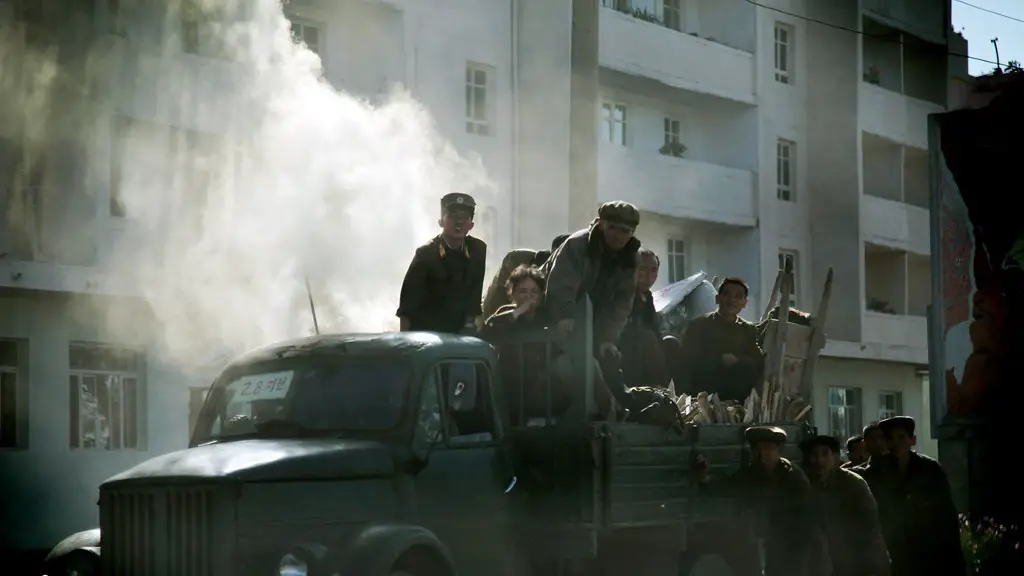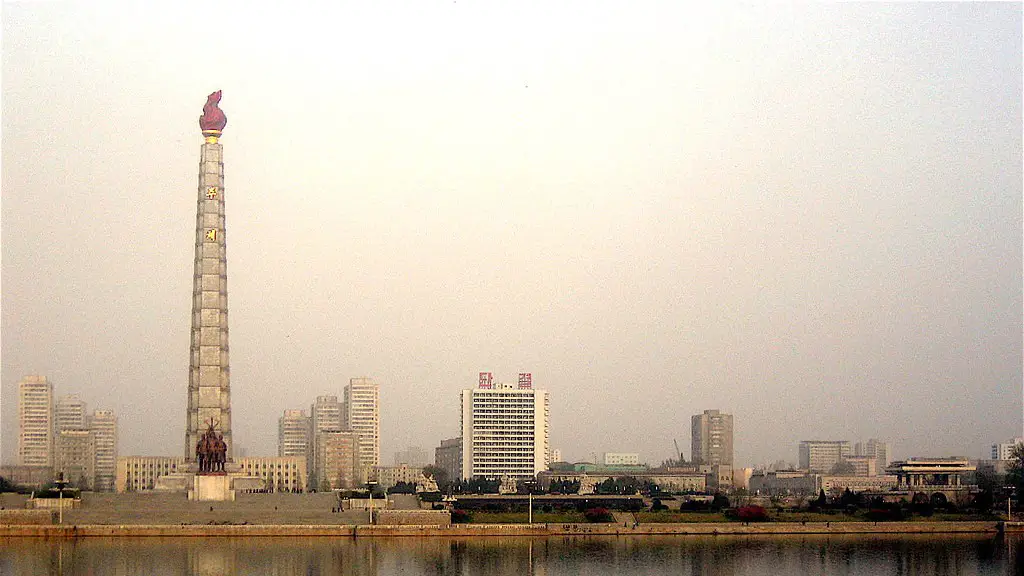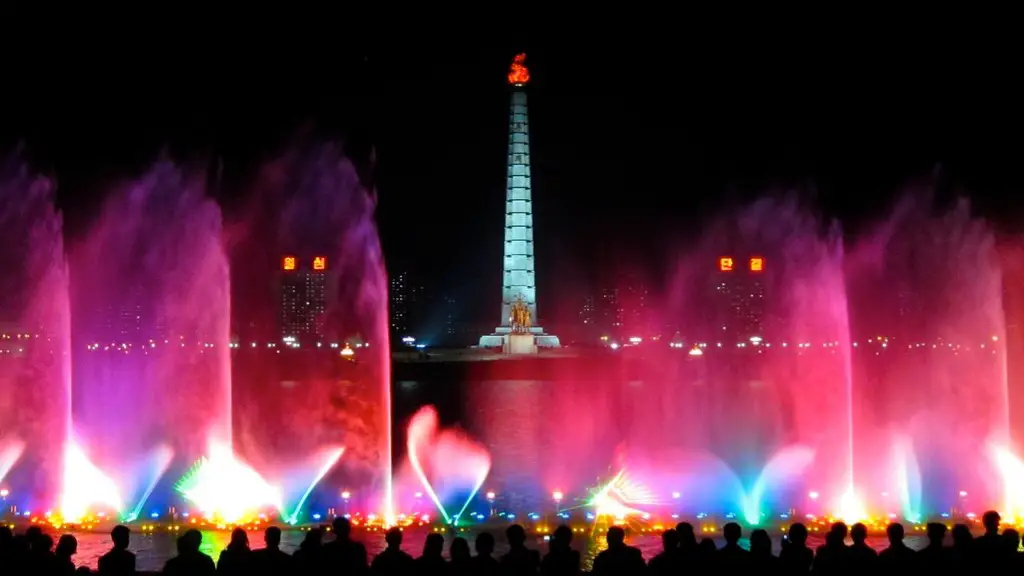The Soviet Union played a significant role in supporting North Korea. During the Cold War, the Soviet Union supported North Korea economically and militarily by providing essential resources, money and training. The Soviet Union also propped up North Korea’s totalitarian regime politically and diplomatically in the hope it would form an effective buffer between the USSR and the West. It is safe to say North Korea would not exist in its current form without the support of the Soviet Union.
Soviet aid to North Korea began in the late 1940s, shortly after World War II. The Soviets provided North Korea with aid, weapons and military personnel to ensure it would remain strongly allied with the Soviet Union. Throughout the Cold War, North Korea relied heavily on the Soviet Union for financial support, military personnel and crucial supplies such as food and fuel. The United States, Japan and South Korea provided only limited aid during this period.
In the early 1990s, shortly after the fall of the USSR, North Korea entered a period of economic crisis known as the ‘Arduous March’. Despite the end of the Cold War and the dissolution of the Soviet Union, North Korea continued to receive aid from the new Russian government. This was largely due to North Korea’s use of the ‘Beijing-Moscow axis’, whereby North Korea maintained good political and economic relations with both China and Russia. The aid provided by Russia during this period was essential to North Korea’s survival.
The Soviet Union also provided North Korea with military training and weapons during the Cold War. This included tanks, artillery and other weapons, as well as technical advisors and military personnel. In 1978, the Soviets even sent a military mission composed of 100 officers to help the North Korean army. This military aid ultimately played a key role in strengthening North Korea’s military capabilities.
In addition to military and economic aid, the Soviet Union also supported North Korea politically and diplomatically. The Soviets often used its influence at the United Nations to oppose United States and South Korean initiatives designed to weaken North Korea’s position. This form of political support was particularly important in helping North Korea maintain its independence from the United States and South Korea.
Overall, the Soviet Union played a crucial role in helping North Korea survive during the Cold War. Without the military and economic aid provided by the Soviets, it is doubtful North Korea would still exist today. Thus, it is clear the Soviet Union played a substantial role in the development and survival of the North Korean regime.
The Korean War
The Soviet Union’s support for North Korea was also significant during the Korean War (1950-1953). During the war, the Soviets provided North Korea with military and economic aid, as well as technical and political support. This included weapons, ammunition, fuel and food supplies as well as military advisors and other personnel. In addition, the Soviet Union played a key role in diplomatically supporting North Korea in international organizations, such as the United Nations.
During the war, the Soviets also provided critical air support to North Korean forces. By the end of the war, over 5,000 Soviet advisors and combat troops had served in North Korea. These troops played a key role in helping North Korea to push back the assault from the United States, United Nations and South Korean forces.
The Soviets also provided much needed economic assistance to North Korea during the conflict. This included money, food and supplies, as well as other resources needed to sustain the North Korean people. North Korea’s desperate need for following the destruction caused by the war, and the Soviet Union’s support was essential in helping North Korea to begin repairing the damage.
In conclusion, it is evident the Soviet Union provided crucial support to North Korea throughout the Korean War. Without this support, the North Korean forces would have been unable to fend off the United States and United Nations-led forces. Thus, it is clear the Soviet Union played an essential role in helping North Korea survive the Korean War.
The Sino-Soviet Split
The Sino-Soviet Split, which began in the 1950s and worsened over the years, also had a significant effect on North Korea. Before the split, China and the Soviet Union were both heavily involved in supporting North Korea economically, politically and militarily. However, with the deepening rift between the two countries, North Korea was forced to choose between China and the Soviet Union.
North Korea chose the Soviet Union and ended up heavily reliant on the Soviets for military and economic support. North Korea’s decision to choose the Soviet Union over China was driven by its desire to remain independent from both China and the West. By choosing the Soviet Union, North Korea was able to maintain its diplomatic neutrality.
Throughout the Sino-Soviet Split, North Korea remained heavily reliant on the Soviet Union for support. This included economic aid and military training, as well as resources and personnel. Despite the split, the Soviets continued to provide crucial aid to North Korea, enabling it to remain independent and secure.
The Sino-Soviet Split had a profound effect on the relationship between North Korea and the Soviet Union. Without the Sino-Soviet Split, it is likely the relationship between North Korea and the Soviet Union would have been much different. Thus, it is clear the split had significant consequences for the Soviet-North Korean relationship.
The End of Soviet Union’s Support
The end of Soviet Union’s support for North Korean in the 1990s had a noticeable effect on the North Korean government and economy. Following the collapse of the Berlin Wall and the fall of the Soviet Union, North Korea was no longer able to rely on the Soviets for economic and military support. This meant North Korea had to look elsewhere to fulfill its needs, primarily China.
North Korea’s economy quickly deteriorated following the end of Soviet Union’s support. The loss of economic aid, military training, and personnel had a damaging effect on the economy. In addition, the loss of technical expertise meant North Korea was unable to maintain its industrial capabilities. This ultimately led to a decline in North Korea’s industrial production.
The end of Soviet Union’s support also caused North Korea to become more isolated diplomatically. Without the influence of the Soviets in international organizations, North Korea was unable to effectively oppose United States and South Korean initiatives. This further entrenched North Korea’s isolation from the West.
Overall, it is evident the end of Soviet Union’s support for North Korea had a significant effect on the North Korean government and economy. North Korea’s economic decline and diplomatic isolation can be attributed largely to the end of Soviet Union’s support.
The Impact of Soviet Union’s Support
The support provided by the Soviet Union to North Korea had a major impact on North Korea’s economy and military. The Soviets’ support enabled North Korea to remain independent from the West and develop an advanced military and industrial base. Without Soviet aid, it is unlikely North Korea would have been able to build a powerful military and economy.
The Soviet Union’s support also enabled North Korea to remain relatively stable politically. During the Cold War, the Soviets helped North Korea maintain its totalitarian regime and prevent the influence of the West. This helped North Korea to remain isolated from the rest of the world and enabled it to survive as an independent state.
The support from the Soviet Union also allowed North Korea to develop its nuclear weapons program. This proved to be a crucial factor in North Korea’s ability to remain independent from the United States and other Western nations. The nuclear weapons program would not have been possible without the support of the Soviet Union.
Finally, the Soviet Union’s support helped North Korea to survive during many difficult periods, such as the Korean War and the ‘Arduous March’. Without Soviet aid, it is likely North Korea would have been unable to survive these periods of economic and political crisis.
Overall, it is clear the support provided by the Soviet Union was essential in helping North Korea survive the Cold War and develop its economy and military. The Soviets’ support enabled North Korea to remain independent and build a powerful military and industrial base.




